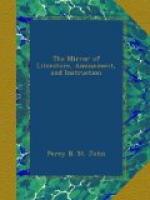When a great man dies, he leaves a chasm which eternity cannot fill. Others succeed to his fame—but never to the exact place which he held in the world’s eye;—they may be greater than the one we have lost—but they are not he. Shakspeare built not his throne on the same site as Homer—nor Scott on that whence Shakspeare looked down upon the universe. The gap which Scott leaves in the world is the token of the space he filled in the homage of his times. A hundred ages hence our posterity will still see that wide interval untenanted—a vast and mighty era in the intellectual world, which will prove how spacious were “the city and the temple, whose summit has reached to Heaven.”
New Monthly Magazine.
* * * * *
TO A ROSE.
THE THOUGHT FROM THE ITALIAN.
Queen of Flora’s emerald bowers,
Imperial Rose, thou flower of flowers,
Wave thy moss-enwreathen stem,
Wave thy dewy diadem;
Thy crimson luxury unfold,
And drink the sunny blaze of gold.
O’er the Zephyr, sportive minion,
Spreads the blue, aurelian pinion.
Now in love’s low whispers winging,
Now in giddy fondness clinging,
With all a lover’s warmth he wooes
thee,
With all a lover’s wiles pursues
thee.
And thou wilt yield, and thou wilt give
The sigh that none can breathe and live.
Like lovelier things, deluded flower,
Thy date is short; the very hour
That sees thee flourish, sees thee fade;
Thy blush, thy being, all a shade.
Yet, flower, I’ll lay thee on a
shrine,
That makes thy very death divine.
Couch’d on a bed of living snows,
Then breathe thy last, too happy rose!
Sweet Queen, thou’lt die upon a
throne,
Where even thy sweetness is outdone;
Young weeper, thou shalt close thine eyes
Beside the gates of Paradise.
On my Idalia’s bosom, thou,
Beneath the lustres of her brow,
Like pilgrims, all their sorrows past,
On Heaven their dying glances cast,
Thy crimson beauty shalt recline,
Oh, that thy rapturous fate were mine!
Blackwood’s Magazine.
* * * * *
NEW BOOKS.
LIVES OF SCOTTISH WORTHIES, VOL. II., [Or the 34th volume of the Family Library, is rife with interesting details of the proudest areas of Scottish history; but more especially of the chivalric courses of Robert Bruce and James the First. We quote half-a-dozen vividly written pages, from the former, describing the memorable Siege of Berwick, in 1319.]




